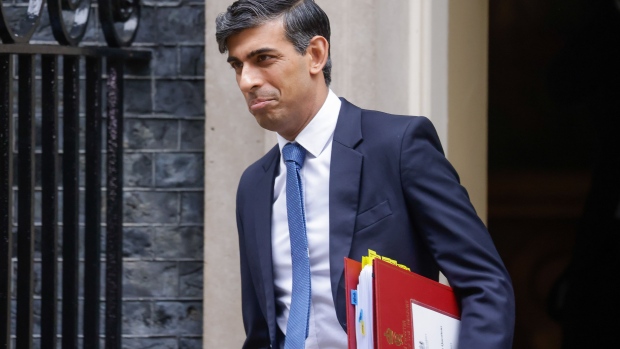Mar 10, 2024
Sunak Points to Welfare Curbs for Future UK Tax Cuts, Times Says
, Bloomberg News

(Bloomberg) -- UK Prime Minister Rishi Sunak is considering curbs to welfare spending to fund the government’s ambition of further tax cuts, according to The Sunday Times.
Sunak reiterated the Conservative Party’s goal to abolish national insurance contributions in an interview with the newspaper, after Chancellor of the Exchequer Jeremy Hunt last week slashed the payroll levy by 2 percentage points, additional to a similar-sized cut that was announced in the autumn.
“We want to end this double taxation on work,” Sunak said. “All that money ultimately goes into the same pot to fund public services.”
Sunak said that Britain’s welfare system “isn’t working properly,” pointing to the almost 2.5 million working-age people that have been signed off as unfit to work, three times as many as a decade ago.
Government officials are expecting another fiscal event later this year, when lower inflation and interest rates may provide Hunt with more headroom for further cuts. The Tories are banking on such a move to help shore up its support ahead of an election that has to be held by January at the latest, with the Conservatives trailing the opposition Labour Party by 27 points in the latest YouGov poll.
Targeted Measures
Labour’s Rachel Reeves, the shadow chancellor, said the party would introduce targeted measures to gain additional tax income from private schools and gas companies for the funding of public services.
Read more: Fuzzy Tax-Cut Plans Show Sunak Far From Ready for Early Election
“There’s a number of areas where we would go further than the government and provide that immediate injection of cash to public services,” Reeves said in an interview with Sky News on Sunday. ‘We would invest in those things to boost our growth and productivity.”
The Institute for Fiscal Studies, an economic research think-tank, said neither the government nor Labour is transparent with their plans on how they would fund the payroll levy cuts that Hunt has announced in recent months.
“No one is talking about that, no one is saying where those cuts would come from, or whether there would be significantly more borrowing,” Paul Johnson, IFS director, told Sky News. “Unless a Labour government would reverse that, one way or another, that means they have £10 billion less for investment in public services.”
©2024 Bloomberg L.P.